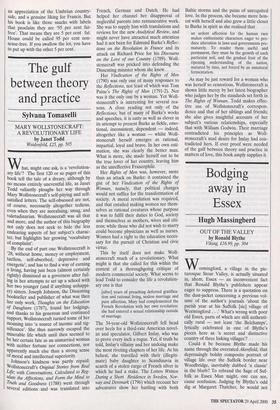The gulf between theory and practice
Sylvana Tomaselli
MARY WOLLSTONECRAFT: A REVOLUTIONARY LIFE by Janet Todd Weidenfeld, £25, pp. 505 What, might one ask, is a 'revolution- ary life'? The first 120 or so pages of this book tell the tale of a dreary, although by no means entirely uneventful life, as Janet Todd valiantly ploughs her way through Mary Wollstonecraft's self-pitying and self- satisfied letters. The self-obsessed are not, of course, necessarily altogether tedious, even when they are moralising, smug, and valetudinarian. Wollstonecraft was all that and more, and the author of this biography not only does not seek to hide the less endearing aspects of her subject's charac- ter, but highlights her growing 'vocabulary of complaint'. By the end of part one Wollstonecraft is '28, without home, money or employment, tactless, self-absorbed, depressive and energetic', and has to find a way of earning a living, having just been (almost certainly rightly) dismissed as a governess after fail- ing in her attempts to set up a school with her two younger (and if anything unhappi- er) sisters. Joseph Johnson, the Dissenting bookseller and publisher of what was then her only work, Thoughts on the Education of Daughters (1787), found her lodgings, and thanks to his generous and continued support, Wollstonecraft turned some of her moaning into 'a source of income and sig- nificance'. She thus narrowly escaped the miserable life which until then seemed to be her certain fate as an unmarried woman With neither forth= nor connections, nor apparently much else than a strong sense of moral and intellectual superiority. . Johnson's kindness was partly repaid; Wollstonecraft's Original Stories from Real Life; with Conversations, Calculated to Reg- ulate the Affections, and Form the Mind to Truth and Goodness (1788) went through several editions and was translated into French, German and Dutch. He had helped her channel her disapproval of neglectful parents into remunerative work. She was to supply him with translations and reviews for the new Analytical Review, and might never have attracted much attention had it not been for Edmund Burke's Reflec- tions on the Revolution in France and its attack on Richard Price for his Discourse on the Love of our Country (1789). Woll- stonecraft was pricked into defending the Dissenting minister whom she knew.
Her Vindication of the Rights of Men (1790) was only one of many responses to the Reflections, not least of which was Tom Paine's The Rights of Man (1791-2). Nor was it the only one by a woman. Yet Woll- stonecraft's is interesting for several rea- sons. A close reading not only of the Reflections, but of many of Burke's works and speeches, it is catty as well as clever in its attempt to present Burke as fickle, emo- tional, inconsistent, dependent — indeed, altogether like a woman — whilst Woll- stonecraft herself emerges as rational, impartial, loyal and brave. In her own esti- mation, she was clearly the better man. What is more, she made herself out to be the true lover of her country, leaving him as the unreflective Francophile.
Her Rights of Men was, however, more than an attack on Burke: it contained the gist of her Vindication of the Rights of Woman, namely, that political changes would not suffice for the transformation of society. A moral revolution was required, and that entailed making women see them- selves as rational creatures whose purpose it was to fulfil their duties to God, society and themselves as mothers, wives and citi- zens; while those who did not wish to many could become physicians as well as nurses. Women had a right to the education neces- sary for the pursuit of Christian and civic virtue.
This by itself does not make Woll- stonecraft much of a revolutionary. What might is that she called for this within the context of a thoroughgoing critique of modern commercial society. What seems to lead Todd to consider the life a revolution- ary one is that
[after] years of preaching deferred gratifica- tion and rational living, sexless marriage and pure affection, Mary had complemented the French Revolution with her own revolution: she had entered a sexual relationship outside of marriage.
The 34-year-old Wollstonecraft fell head over heels for a third-rate American novel- ist and speculator, Gilbert Imlay, who was to prove every inch a rogue. Yet, if truth be told, Imlay's villainy and her undoing make the most riveting chapters of her life. At his behest, she travelled with their (illegiti- mate) baby daughter to Scandinavia in search of a stolen cargo of French silver in which he had a stake. The Letters Written During a Short Residence in Sweden, Nor- way and Denmark (1796) which recount her adventures show her battling with both Baltic storms and the pains of unrequited love. In the process, she became more hon- est with herself and also grew a little closer to Burke in spirit as she realised that
an ardent affection for the human race makes enthusiastic characters eager to pro- duce alteration in laws and governments pre- maturely. To render them useful and permanent, they must be the growth of each particular soil, and the gradual fruit of the ripening understanding of the nation, matured by time, not forced by an unnatural fermentation.
As may be just reward for a woman who was herself so censorious, Wollstonecraft is shown little mercy by her latest biographer who judges her by the standards set forth in The Rights of Woman. Todd makes effec- tive use of Wollstonecraft's correspon- dence and that of her siblings and friends; she also gives insightful accounts of her subject's various relationships, especially that with William Godwin. Their marriage contradicted his principles as Woll- stonecraft's mad desire for Imlay had con- tradicted hers. If ever proof were needed of the gulf between theory and practice in matters of love, this book amply supplies it.


























































 Previous page
Previous page